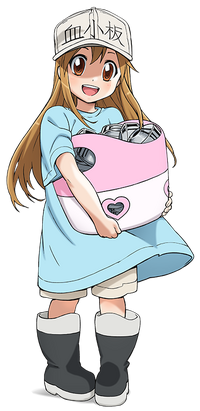| Platelet | ||
|---|---|---|
| JAPANESE NAME | 血小板 | |
| ROMANJI | Kesshōban | |
| ALIASES | Leader-chan | |
| CHARACTER STATUS | ||
| STATUS | Active | |
| GENDER | Female | |
| SPECIES | Platelet Cell | |
| AFFILIATION | Platelet Division Megakaryocyte | |
| OCCUPATION | Construction Worker | |
| DEBUT | ||
| ANIME DEBUT | Episode 1 | |
| MANGA DEBUT | Chapter 1 | |
| VOICED BY | ||
| JAPANESE | Maria Naganawa | |
| ENGLISH | Xanthe Huynh | |
Platelet (血小板 Kesshōban?) is a minor character in Cells at Work!
She is a type of blood cell working under the Platelet Division. Together with her kind, she is responsible for reconstructing injuries and forming blood clots in the body.
She is usually accompanied by a platelet boy who appears to assisting her in all tasks.
Appearance
Due to the Platelet's actual cell size, they are depicted as children. She is a small cell with waist-length caramel blonde hair and brown eyes. She wears the Platelet uniform which contains of a light brown cap, an over sized blue T-Shirt with light brown shorts underneath and black boots with white fur in them, and is always seen working with her fellow workers. The uniforms are reminiscent of real life Kindergarten students.
Personality
Platelet is a polite and bouncy cell that manifests a strong leadership to other Platelets. Her innocent and humble character makes her lovable to other cells. She enjoys the cuddling and attention she gets from AE3803.
Abilities
Despite their size and looks, Platelets play important roles in the body, such as fixing wounds.
- Overall Abilities: Platelets are powerless against threats. However, they are small and nimble, thus able to move through bacterium to cover up wounds under the protection of white blood cells.
- Hemostasis: Platelets can aggregate together to close an open wound. They use a protein known as "Von Willebrand Factor" to help them, which functions similarly to super-glue. The "Coagulation Factors" in the blood will work to coat the clot with a net of Fibrin, causing it to solidify.
- Thrombus (Blood Clot): Platelets are dragging nearby red blood cells and/or white blood cells and binding them with fibrin net to form a plug.


